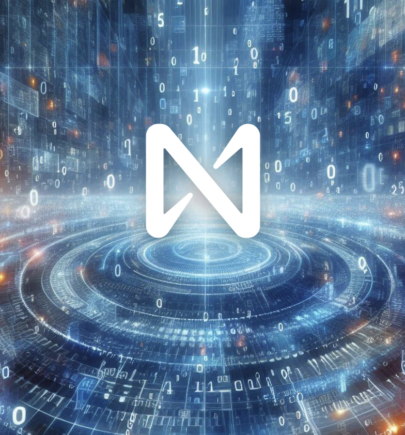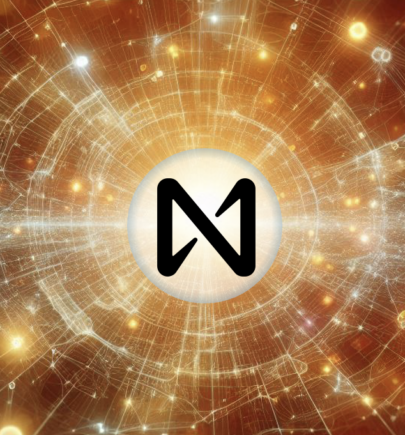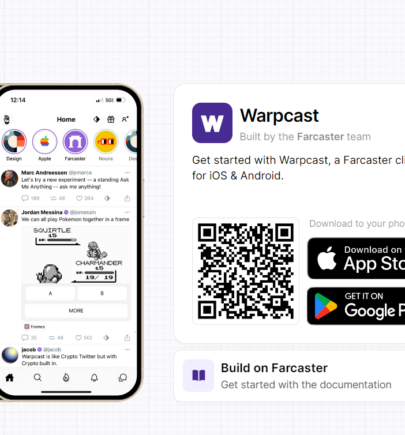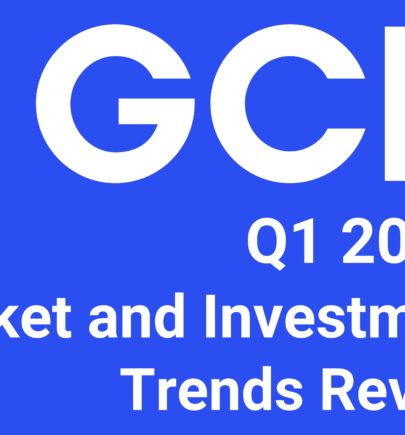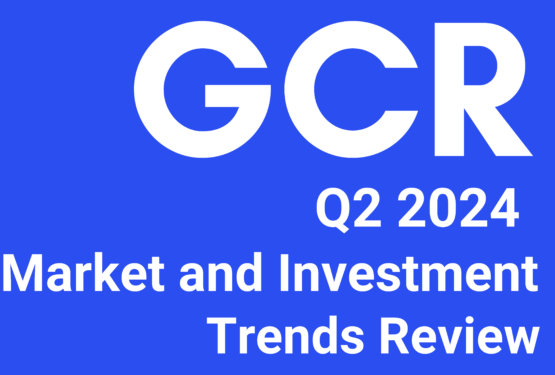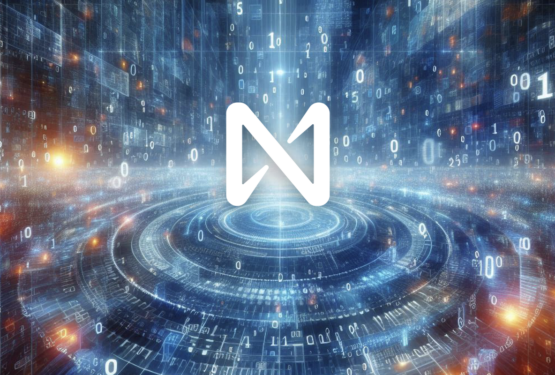Interview with Cryptokitties Co-Founder on Regulatory and Go-to-Market Challenges in Asia and the Company’s $12mn Fundraise
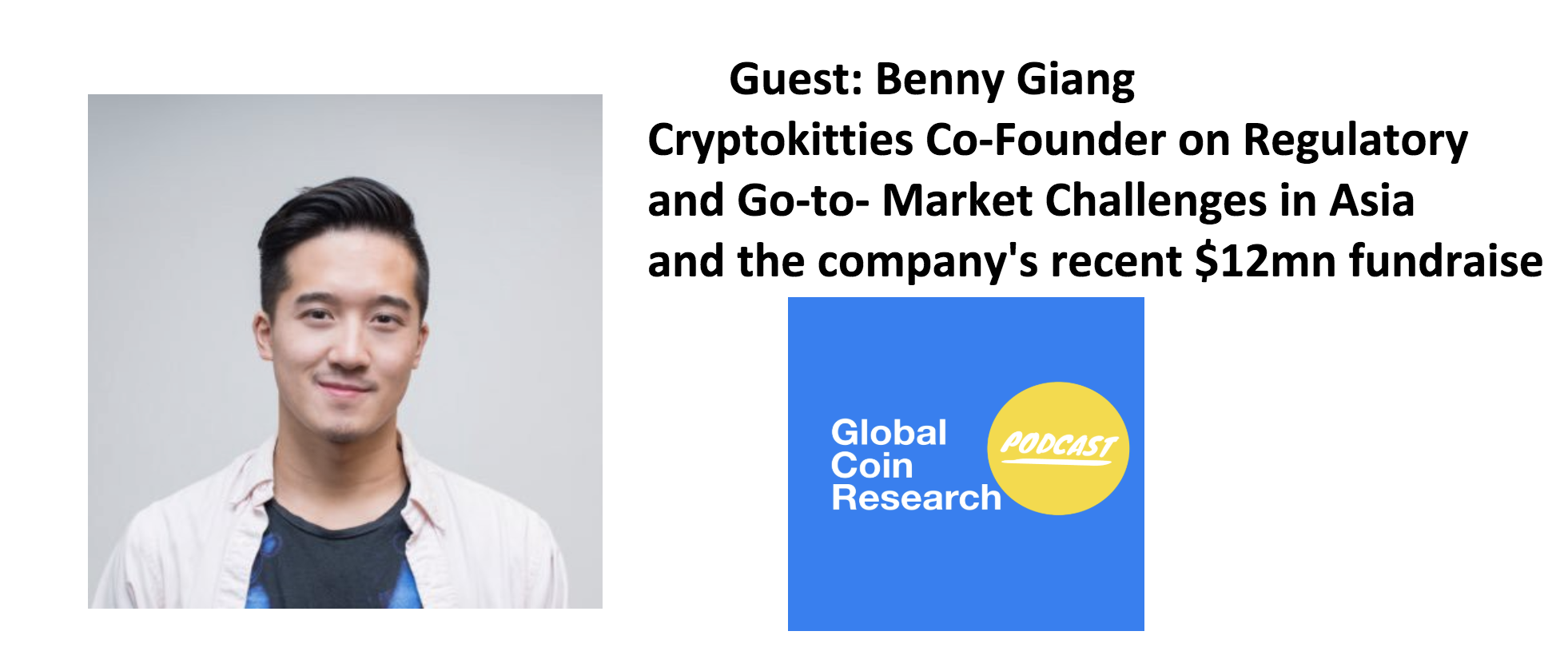
In this episode, Joyce Yang from Global Coin Research is joined by Benny Giang, co-founder and Fortune Cat at CryptoKitties. As CryptoKitties is one of the leading companies venturing into Asia, Benny is able to give unique insights about the team’s experience. He guides us through the team’s recent fundraising from Andreessen and Union Square Ventures, dispel media reports of company DAUs (daily active users) going down, and projects what the team plans to accomplish in Asia. He also offers unique insights for foreign companies who want to find success in the Asian market and gives thoughts on the regulatory and Blockchain environment there.
Time stamps and topics discussed our interview
- 2:06 — Why is Benny Giang Fortune Cat? The early days of CryptoKitties, relationship with Axiom Zen and the team’s culture.
- 5:03 — Announcements from Jun 26th on the launch of KittyVerse and the Nifty License.
- 9:25 — What drove CryptoKItties’ decision to go to Asia and what were some things unique to the China market?
- 15:50 — How does Cryptokitties feel about the other Asian countries besides just China?
- 16:20 — Company’s experience dealing with both local gaming companies like Tencent and crypto regulators.
- 18:00 — The spectrum of decentralization relating to games like CryptoKitties vs that of SpankChain
- 20:02 — What measurable goals are CryptoKitties aiming to accomplish in Asia
- 21:15 — Benny’s future predictions about Blockchain in Asia that may vastly be different from what we come to understand in the West
- 24:17 — The rapid rise of large tech conglomerates in Asia implementing tokens across all of their products such as 17Media’s Mithril
- 27:00 — Practical advice and insights from Benny around how to go to market in Asia including diversifying your audience, dealing with difficult regulators, and finding the right type of partners.
- 36:17 — Benny answers questions that we received from our Global Coin Research newsletter readers. ? Be sure to tell your friends to subscribe at globalcoinresearch.com so they can participate in future questions!
- What are the company’s plans for the $ 12 million dollars that it just raised from Andreessen Horowitz and Union Square Ventures?
- Is the news on active users of CryptoKitties going down to a few hundred true? If true, what plans are you doing to re-ignite the user base?
- 42:39 — How does Benny think about the different Crypto communities globally?
Listen to it on iTunes or here on Soundcloud:
Full Transcript
Benny Giang
One of the pivotal points where I realized how Chinese people do business is we have these product sessions internally where we talk about building startups and learning more about different products. And I remember this distinct time when we talked about Uber versus Didi and what happened to Uber in China.
Joyce Yang
Hi everyone, welcome to the global coin podcast. A podcast where we hear from leading global operators and investors in crypto, with their thoughts on the Asia Blockchain and cryptocurrency space. Asia is really a cryptocurrency hub, and understanding the region is as important as understanding what’s going on locally. We also have a daily newsletter that highlights all the important crypto news coming out of Asia, with many translated by our staff directly from the local media. Check it out at [globalcoinresearch.com.] I’m your host Joyce Yang and our guest today will be Benny Giang, co-founder and portion cat at Cryptokitties.
Cryptokitties has been one of the leading crypto companies venturing into Asia, and I am so excited to have Benny here today to share the team’s recent updates and their experience going to market there. From my first encounter of meeting Benny to working with him on the podcast, I found him to be a really thoughtful and passionate operator who deeply understands both the crypto and gaming world. I hope you learn as much as I did on this podcast.
Be sure to check out what he’s doing at Cryptokitties and follow him at Benny Giang on Twitter. If you love global coin research podcasts, be sure to let the world know with a review on Apple podcast. The reviews will help new listeners find out of the show. Also spread the word on Facebook, Twitter, Slack, Telegram, and wherever you discuss crypto. And don’t forget to follow us on Twitter at [Globalcoinrsrch]. Keep an eye out for Cryptokitties’s Android launch in August as well. Thanks so much Benny for coming on the show.
Benny Giang
Well, thanks so much for inviting me on the show Joyce, it’s super exciting. I’ve been following your newsletter for a while now. So I’ve learned a ton about Asia, particularly China, Japan, and Korea. So the news has been super helpful. I’m a fortune cat because I was spearheading the Asia initiatives and Asia partnerships and launching cryptoKitties in, particularly China. So I thought it would be a good homage to have “fortune cat” being the icon that I selected. A couple of team members selected other types of cats like Mark who is our Chief Creative Officer, he is selected “fat cat.” I think that’s just super hilarious and I think for us, we come from a parent company called Axiom Zen. And Axiom Zen is just… I mean, I could talk about that story a little bit later down the podcast, but we never really took ourselves too seriously. So part of the onboarding of Axiom Zen is that you get to pick whatever title you want. And people don’t really pick Manager or VPO, no one really cares. So when I joined Axiom Zen, I picked Bridge Builder because building bridges is kind of metaphorical and there was this poem that was very inspiring. And so it was very natural when we built Cryptokitties and we built that culture early on, we decided to pick some funny titles. And to be honest, the company’s growing so fast. It’s really hard to nail down exactly what you’re doing because you just do so many things all the time. So picking something like fortune cat; it was perfect for me.
Joyce Yang
So just to understand better, how big is your team and does everyone have a cat named to them?
Benny Giang
That’s a good question. So the team is nearing 40 now for Cryptokitties specifically. And the core team, we’re not allowed to own cats, so I don’t own any cats at all. It’s a weird thing to say, it’s like I test the game on the test net, but I don’t own any actual cats. So it’s actually sometimes difficult for us to do Q&A on the game when we can’t go through the flow. But one of the ways that we saw this early on was we built a community on Discord and Reddit, and we actually hired from our community. So a lot of our Community Managers played the game quite a lot actually still, and they’re our source of truth by giving us the feedback that they see in the community and the direct feedback loop that we need. Some of the people on the company have given them different cat names, some of the new people that we’ve hired; they’ve come from traditional industries or other tech companies. So they’re still not really used to it. So they have bigger titles. But for us, it’s like let’s see how long we can carry this on and have this culture where we don’t really take ourselves too seriously. We put cats in the Blockchain. So how serious can it be? Really.
Joyce Yang
Well, good fight how much you say that you guys are not taking yourselves seriously. You made some pretty impressive announcements. So before we dive into what you are doing either, I love to hear from you the big announcement that you just made.
Benny Giang
So yeah, that’s super exciting. I think it is the perfect timing for this podcast and for us to jump on a call, Joyce. We just announced KittyVerse and so KittyVerse is something we’ve been working on for a while now. It makes CryptoKitties kind of like a platform and in a decentralized way. When you own an actual cat as a person who would you know maybe you buy some cats. You own these cats. So it’s in your right to do whatever you want to do with it. And so in this sense, we started to see early on that people were building different gaming experiences like Kitty hats, Kitty races, Kitty battles and so you as the person who owns these cats, you could take it to these games and play some other game, you could dress up your cat, and there’s a bunch of actually community tools. So to date, I think there are about 34 projects that are in the KittyVerse and so the best way to think about it is CryptoKitties is like the planet and there’s like all these moons orbiting around it and it’s super fascinating. And a part of the announcement is we also crafted the Nifty License. So we’ve updated our terms and services to accommodate the Nifty License, and what a Nifty license does is that it’s a license where people as a game creator… I mean, we have a designer, Gillae, who was our director and he still is drawing these fancy cats.
Like the Fortune cat and the Dragon cat. And so there’s this very interesting exploration around licensing. We’ve been talking about this for a while since we’ve launched. The fact that where you buy the cat, you own it. But we are the ones who drew it. So we’re just the kind of creative license apply and so we’ve been working really closely with our lawyers to figure out how we could find the perfect medium where we could give control to the people who own these cats, so then they could make T-shirt, and make caps or decorate their house with CryptoKitties that they own, and then how can we define it in in the sense that people who want to start side businesses like Shopify stores, how would that work? So the Nifty licenses is still a work in progress and we launched it this week for the intent of getting feedback from the community. The intent for the Nifty License is that other Blockchain games who have run into a similar problem would like to use this template license and use it for their own games. So we made it easy for them to swap in the names and have this cleared from our own lawyers. So all in all, it’s been super exciting. For the KittyVerse, and specifically on our website, you could read more information at slash KittyVerse, but what we’re doing with these 34 projects is the ones that are really serious, we would be providing some form of investments to them developing these gaming experiences. And there will be some form of revenue share that will take part until that investment is paid back. So really, it’s us investing in these experiences. And we’ve been getting a lot of people who tell us in the early days like “hey, the cats are just a 2D image. What do you do with it?” You buy it, you sell it, trade it. And they’ve been dying to … Number 1; gets these cats in 3D and in augmented reality which we’ve been exploring, it’s not yet ready. And the other thing is “Okay, I want to do more things with my cat” and we completely agree with it. Now, whether or not our team builds all the gaming experiences or we have these people who would love us and are part of the community who want to build these things, we figured “why don’t we just incentivize them and have this grow together as a community?” So that’s the reason why we built the KittyVerse.
Joyce Yang
Yeah, that’s great. I think you guys are really removing all the barriers to the legal processes and providing that platform for people just to contribute, will be something that’s really exciting. So I can’t wait to see that. So going back to what we’re looking to talk about in this episode which is specifically on your expertise taking CryptoKitties to Asia. First of all, if you can give everyone a background they didn’t know about the partnership in Asia, that’s a big deal. And why are you doing it in the first place?
Benny Giang
Yeah, so I think it was very early this year. Literally one month after we’ve launched, we started to see a lot of activity and copycats that pop up and they came from mostly China. So we had larger companies like Baidu, Netease, 360, Xiaomi and now recently Tencent. Coming up through copycats of CryptoKitties, they had other dogs or rabbits or whatever, and they literally just take the same exact website and they just put in their items. So I mean for me being Chinese, but being born in Canada, one of the pivotable points where I realized how Chinese people do business is we have these product sessions internally where we talk about building startups and learning more about different products. And I remember this distinct time when we talked about Uber versus Didi and what happened to Uber in China. They were burning like a billion dollars a year to basically acquire users and it was like a race, and you can read all about it. And when we were talking about that, I was like “Holy Moly” this is like on another ballpark in terms of competition. And being Chinese, I think we recognize that since we were born, we are always competing whether it’s like in Chinese school or wherever or math, we always have to be at the top. So I understood like “okay, I get exactly why they’re like this” so for us when we saw these copycats, I told the team and I was like “they’re copying us and these are big companies.
So number 1 is we should be proud because we’ve made something that is very interesting to the Chinese market.
Number 2 is let’s make a decision. Should we launch immediately and go in faster than them? Of which the Chinese companies would be like “these guys; they’re going faster than we’re going” which is interesting, or we wait 7 to 8 months and then do a launch in China.
So obviously, I opted in for “let’s go in immediately.” Now, that required a lot of strength in the developer, side-designer side. We had to create a whole Chinese brand, Chinese name, and work with Chinese influencers. We established a partnership with Animoca brands which is a gaming company based in Hong Kong. The reason why we did that is because gaming companies in mainland China are still trying to understand what Blockchain is about, and just with the fact that ICO’s and exchanges are banned in China, even these large companies like Tencent and Alibaba; even though they have Blockchain research teams internally, none of them were touching Ethereum or Bitcoin or any of these public cryptos at least announcing publicly. So in the same case, these gaming companies that we talked to previously in Shenzhen and mainland China, they were very interested, but they’re like “we don’t know if we could fully kind of publicly touch this until somebody else does it. So we were like “well, Hong Kong is a great medium because we’re just pretty close to Shen Jen.” And we had relationships with Animoca brands Prior, they’re a really smart company. They’ve done really cool things with different IPS like Doraemon. So we partner up them and we essentially aim to launch to the Chinese version of CryptoKitties in February or Chinese New Year, so there’s a whole campaign there. That had its own challenges that we could dive into later around the App store and the growth of the community there but essentially, that’s the reason why we decided to push really fast into China and in August this year, we will be doing the Android version. So we’ve regrouped and did some findings and some learnings and then we’re going to relaunch the Android version in China.
Joyce Yang
Yeah, that’s great. That does a lot of gems there. And one thing you mentioned was that it sounds like there’s a lot of looking towards the big guys and what they’re doing you know only if Tencent and Alibaba come out using public watching, and would they feel like they’re comfortable and government blending them? And then the second is that you mentioned Android because the Android phones also very prevalent in China. And I don’t know the exact market shares, but I feel like an Android is actually quite more significant than in the U.S. right?
Benny Giang
Absolutely. I think Android is the highest market share. When we first launched, it was IOS. So we have a strong IOS capacity here in our teams. The reason why you picked IOS is for the advantages of distribution. The reason being that the App Store is still in China. So if you get in, then you get in. You have access to all the users, even though that’s a small amount of the market share. Android is a huge market share, but there is no Google Play Store in mainland China. So you have to cut a deal with all of these different Android stores like Tencent store, 360 store, and what I mean by cutting a deal; you have to do a revenue share deal with them. So if we already committed to a partnership with a game publishing company, we would have to recommit to… it’s more like we would have to cut the pie into smaller pieces for these other Android stores. Also on that point, if you were to cut a deal with the biggest guys like Tencent to release your app, and I’m not even talking about crypto because they are not going to do crypto, but just a normal game, it’s been heard that they would take 80-90%. So what is there to leave you with when Tencent decides like “we’ll distribute yours to 100 million people, we’ll take 90% of all your revenue, and then how much are you going to give to your game publishing partner and then how much will you pocket? So obviously, there’s a disconnect there. Those are things that other people listening to this podcast if you’re thinking about, these are things you should consider if you’re trying to do a consumer push into China.
Joyce Yang
Yeah, Wow. Are you guys… this is the base focus in China for now or have you been exploring all over in Asia?
Benny Giang
So yeah, that’s a good question. We’ve been exploring Korea, Japan, and actually this week looking into Southeast Asia, all of these regions have their very intricate and interesting challenges. That being said, Japan and Korea; they’re highly regulated. They are accepting of crypto, but the interesting thing for a Blockchain game is that we sit in between two regulatory bodies. One is gaming and one is crypto. You may create a crypto project or adapt that is completely crypto related-Blockchain related, and you’ll just need to deal with one regulation. If you’re creating something like us where it’s sitting between the two, then there are gaming laws that exist in Japan and Korea that actually are different that you have to abide by. And so we’ve been talking to lawyers from Korea and Japan, and talking to large companies like Nexon that are based in Korea and also have offices in Japan. It’s been very interesting to hear the perspective of… yes they’re very interested in this, but they don’t really know exactly what they’re going to do. And the third thing is getting the lawyers on board. Right now, it’s like a gray area on the fence. So those two regions have been very interesting. Southeast Asia; that could be interesting because the regulations are looser. Like in Singapore, it’s more accepting. But the question you must ask yourself is the market share for gaming big in Southeast Asia? And in some cases it is, but China is ultimately the biggest around the world for holding the amount of revenue for mobile gaming, and Korea for desktop and mobile. So it’s really a balance all these factors, for you to consider when you’re deciding to launch a Blockchain game in these areas.
Joyce Yang
Yeah. It sounds like when you guys are trying to enter this country, you have to do work with the legal processes and the regulations there. It’s not like for example; I’m thinking that Spankchain. Their product is very underground, but the idea is that they probably can’t even approach these regulators because we have the things that are right there.
Benny Giang
Yeah, and the whole premise of decentralization; there are people on spectrums. There are people who are far left and they’re like anarchists and full decentralization. If I build this Bitcoin, then it will just exist. Like no one could stop it essentially. And then there are people who are on the other end where it’s like whatever the building is essentially like an AWS server. So I guess it’s a ledger of some sort. Now, we’ve typically seen the middle. What we say is like is it decentralized enough? Are the important parts decentralized where you own the cats or the digital asset that you have? But there are certain aspects of the game like the website or we still have a back-end, we have a front-end. That’s how we were able to make the game smooth, make the game beautiful, make it easy to use. And people don’t fully understand that if you’re fully decentralized, then actually, you don’t have to deal with these regulations in the sense that Bitcoin… there are always regulations from countries, but people in China are still buying Bitcoin. So they can’t fully stomp that out, but if you do it that way, then you cannot create a consumer experience. You cannot have billions of people who can interact and play this game. And you as a company, how can you grow your company? So those are the challenges, the reason why we have to deal with the legal regulations first. First and foremost, to have this Blockchain game enter the country.
Joyce Yang
That’s very interesting and that’s really helpful I think for a lot of folks who are looking to go to market and really get a consumer adoption because they probably all have to go through that. Not just in Asia, but in the US as well. Do you guys have specific or measurable goals that you want to accomplish in China and the rest of Asia?
Benny Giang
Yes, I mean there are top-level goals around like expansion of the brands. For us, the top three user base is US, China and Russia. There was the other reason why we decided to pick China, because our users just pointed towards that direction. So I mean our top-level goal is to continue to build a huge community there. We want to have one of the biggest Blockchain Games community in Asia or in China. We mainly want to be able to educate a ton of developers and designers who want to build Blockchain game experiences or even consumer Blockchain experiences. On the metric and I mean for us, they’re the basic ones like downloads, like daily active users over monthly active users. So obviously, we are looking to have that kind of flow in. And then at the most bottom part of the funnel is revenue. So we don’t do it fully for the purpose of just making tons of money. We do it for the purpose of educating the market. I’d say that a trend that you will start to see in the next 3 to 6 months in Asia is these large tech companies in Korea, Japan, China; they will come up with a so-called Blockchain solution. Most of them are private Blockchains, but they have the keys to 300 million to 500 million people, and they will onboard those 100 millions of people on to what they say is the Blockchain. So this whole entire world; and this is something I’ve been thinking about quite a lot recently. The entire crypto space which I think around the world is about 60 million people, or maybe a little less or a little bit more. We have come to realize that Bitcoin is crypto and Ethereum is crypto, and this is what a Blockchain means; distributed ledger, but I think that conversation would be challenged in the next 3 to 6 months by these big companies saying “no, that’s not Blockchain. This is Blockchain.” And their perspective of Blockchain may actually be much different. When we talk about ownership of these items, that’s like you own a car or a house. I think what they’re going to be talking about mostly is interoperability. So take one thing from one game to another. The second thing that they’re probably going to be talking a lot about is around liquidity. So allowing users of multiple experiences or properties that a tech company owns to be able to essentially; and they don’t like to say it too loudly, to cash out. Because previously to this cashing out, you play all these games, you spend hours and all your money on it. The main idea is to trap you in there. To have you continue playing this game, but there is no thought of like having a peer-to-peer experience where people can gain and lose like a real economy would be.
Joyce Yang
Interesting. So then, it sounds like what you’re saying is that there will be a slew of new Blockchain that comes out from China and rest of Asia that calls themselves the real Blockchain. And actually, you’re seeing that a little bit happening because China is admitting Blockchain, but never admitting or recognizing cryptocurrency. So then they are really building and launching a lot of products without a token economics and tokens incentives build on top of it, and then they are calling them Blockchain. I’m curious. Are you saying when these private Blockchains come out, do you think they will come out from the gaming industry primarily, or they’ll also be coming from everywhere?
Benny Giang
They will be chasing after the games first. At least this is my perspective. They will then chase after consumer experiences. So one prime example is in Taiwan, there’s a really fast-growing tech company called 17 Media. And they do live streaming for mostly girls who do makeup or karaoke sing or whatever, and you could send them gifts. Electronic gifts like fake cars and stuff like that. Recently, Jeffrey who’s the CEO of 17 Media; they created Mithril. So Mithril is a Blockchain project that allows the connection of multiple assets through the 17 Media portfolios. So they have like a swag store, they have a live streaming app, they have all these different properties. The best way to think of it is like Amazon, they have multiple twitching all the scenes. And then basically stringing them all together with a unified cryptocurrency that allows for creators to be incentivized to create content, and allows for users to participate. So that’s just like the first glimpse, when I went to Taiwan around February, that’s when I first saw these companies stringing together all their existing services. And then speaking with a bunch of other experts in these tech companies, it seems like it’s going to be the case for sure.
Joyce Yang
That’s so interesting, and it sounds like it says another CryptoKitties, Copy Catter or just another gaming company coming out of the west trying to go to the east now it will be a little harder, or much harder in the next 6 to 12 months because you have these viral sectors being built locally. And then if they don’t have a platform like working with Nifty, then it’s harder for them to catch up. And because they have to learn how to go to market, they have to learn how to figure out what is the best way to position themselves especially now that the industry’s getting more and more competitive.
Benny Giang
Yeah, it’s exciting. I mean from a journalist’s point of view or even someone sitting on the sidelines, I think it’s fascinating. You’ve seen this activity where the four kingdoms are like people are forming their own walled gardens so to say, or they’re all like gathering together and building these really interesting things. From the sidelines of you as an American or you’re a Canadian building these Blockchain games right now as an industry as a whole, the number of potential users you can acquire just aren’t there. The people who are gamers, who understand bitcoin and crypto are very small. And even vice versa where crypto people who play games; that intersection is very small. So you start to see that in the recent news, it’s pointed toward us, but is for everybody as an industry. Just in general, the pie is way too small right now and we’ve been spending the last 5 months basically telling people this like “Hey, you need to diversify your audience, you need to talk to gamers, and go to gaming conferences.” And for us, we’ve been doing that. The other thing is we’re also approaching artists. So we’re setting up art exhibits in really popular areas because we believe that what we’re doing is creating a digital asset, and that’s not constrained by just gaming or art. It’s much more than that. So diversifying the audience is very important and this is something I suggest everyone does.
Joyce Yang
Yeah, that’s really interesting. I think now that the gaming companies hear what you’re saying, they probably will start looking at each side. So I’m curious to hear more about what you guys are seeing on the regulatory funds in different countries, and what has been the most difficult country that you encountered?
Benny Giang
I think China’s the most difficult. There’s a lot of hidden things that exist there. Not being born in China or having these connections, you can recognize it. There are 3 difficult phases from a foreign company’s standpoint.
The first one is you need to understand the personality, how do Chinese people do business, what is their point of view? The way they make deals is usually like “Hey, let me refer you to this person” and you have to talk to like 50 people before you make a deal, and there are other things involved with that.
The second part is around the China firewall. So the fact that you can’t access existing tools that we use on a regular basis in China makes it much more difficult. Literally, when you cross the border, your Facebook, your Google, will just stop working. So you have to switch gears and all that. So that presents its challenges. Not only that. In China, if you’re running a website, you need to get an ICP license, so what that means is Internet Service Provider. So you need to be given the right by the government to have a website running. The second thing is there are some things like the Culture Minister, there is the internet and like these other ministers that you need to talk to in other to get their approval.
And then you get to the third phase where…. So all that, you need to think about, the third one is then you have crypto. So there are different regulatory bodies in China that are thinking about crypto and kind of stating yes or no, or good or bad, or do we want to company come in doing this? So you stack all 3 together, this is the reason why China is extremely difficult. The question that you may be asked is why put yourself through this pain? Why don’t just go to London or Germany or something like that? And I would tend to mostly agree, but the fact is the intersection of gaming and crypto in China is just really huge. Not only that. I really come from the standpoint of education. The fact that ICOs and exchanges have been banned, and the fact that the larger press is building the narrative for Blockchain in some ways, some good. Some ways, not so good. I feel from the perspective of the consumers like the 4 billion people who live in China. This technology is very interesting. It’s really going to empower a lot of people. The fact that ICOs… like for us, we didn’t do ICO. We’re not against ICOs. We think that ICOs allowed for a funding mechanism for people all over the world, but there are people in Philippines, Indonesia and elsewhere; Vietnam, who had no access to VC funding like Silicon Valley, like us who just get on a plane and just get a million dollar check or whatever. So it’s been interesting to allow that access for everybody around the world too. If I have an idea, I could build this type of thing. That being said, a lot of people took advantage of it. ICO is like a poopoo word now. People don’t… like you feel dirty talking about it. Type release we do. That being said like all these people in China; the access to assets that they own, and with the economy building so fast, what we’re actually doing is allowing more people in China to either express their creativity, to either have ownership of items that they cannot, maybe they can’t own a house in Hong Kong. They just can’t afford it. So what are they going to pass on to the kid? Nothing. So maybe they pass on a Rolex watch, I don’t know. But this concept of digital assets and allowing people to be more creative is something that needs to be educated more to the Chinese market. It’s a bigger mission, it’s like a philosophical mission. And I think it’s very important more than like “oh wow, there’s gold there” type of thing. Some people see it that way. Obviously, that is a business decision but philosophically, I think there are just a lot Chinese people as a population. This is a great opportunity to go into the next phase and not just for China, but for any other country as well. Just as ICO is allowed for funding for anyone around the world, this will allow people to own these assets if they didn’t have the choice to do it.
Joyce Yang
Yeah, that makes sense. And I’m curious because from your stats that you see in the CryptoKitty user base, are these similar to what you see in the trading volume and exchanges where half the people are probably coming from Asia and the money also coming from Asia?
Benny Giang
It’s really hard to tell and this is one of the biggest pain points of decentralized apps. We tried our best to make associations from wallet address, but it’s difficult. You could have hundreds of wallet addresses with different IPs. So it’s like I don’t know where you are from. Maybe you’re from Madagascar, I don’t know. But I would say generally at least from the Google Analytics data, the 3 that I’ve listed; US, China, Russia. That seems to be a big trend, but we have also a lot of players just globally spread on all over the place. The fact that the game is in English and in Chinese means it has more access, but for other countries, we don’t have the languages yet.
Joyce Yang
Yeah, that makes sense. And then after seeing all this, what is your advice for people who are trying to go to market in the east? How should they brace themselves and what should they do?
Benny Giang
The biggest lesson that was very interesting is the typical gaming partnership where you partner up with a gaming company to distribute your game, in most cases that works. But what I found is that you actually need two partners. You need one partner on the crypto side. So somebody who is in that region either Japan, Korea, or China, who has deep connections and knows a lot about crypto and Blockchain, and if you build that partnership side and the community side. Then you also need the mainstream heavy marketing channel distribution side which comes from a gaming company. So you need those 2 partners. We have two of those partners. I listed Animoca brands as the gaming company, but we’ve been working with Coin Usage which is coming in from the crypto side. It’s Spencer and Carolyn who are both based in Singapore right now. For Japan and Korea, we’re also deploying a similar strategy. So I would first figure out who are those right people you want to work with and how can you make that work? The second thing is talking to people who have already done it or who has some experiences at least on the tech side or the gaming side. The more people you know, the more people you get educated. I think even listening to this podcast is a good way, or joining your newsletter is a great way to get yourself educated on what’s happening in Asia. Because if you don’t know what’s happening there, then you’re really just like shooting in the dark type of thing. And the third is know the language. Fortunately, and unfortunately for me, I know Cantonese. So I’m good in Hong Kong and some parts of China. I don’t know Mandarin, so it’s a good thing I have like a team that’s able to coordinate a couple of things. But yeah, I would strongly… I left Chinese school very early on. So now, it’s like I should have finished it. So the mistakes you make as a kid; you decided to quit too early, but yes I would strongly suggest having somebody on your team who knows the language or you learn the language. That would just make it so much easier.
Joyce Yang
Yeah, definitely. And download WeChat. So then they can…
Benny Giang
Yeah, WeChat is great.
Joyce Yang
Now, we’ve arrived at a section dedicated to our readers. Our newsletter readers are very devoted and interested in learning more about CryptoKitties, and we’ve got some great questions from them for you. So I like to ask you on behalf of them. This is regarding your most recent fundraising. You guys raised $12 million from intuition and several other very great be fees. What are you guys looking to do with the money? And what is the outlook there?
Benny Giang
Well, first thing is reinvesting into our team. We’ve been hiring quite a lot. We see a big value, like the only reason why we were the ship CryptoKitties and got where we were it’s because of our team members. So we want to carry that forward. I think that’s a very obvious way to spend a portion of the capital. The second thing to consider is in the community. So how can we give back to the community? How can we drive incentives and really make that grow much faster expedited? And where else we would spend it would be around expansions. And one of the biggest problem right now for Blockchain games is around discoverability. So it’s difficult for people to find Blockchain games. The fact that basically none of them are on the App Stores and quite until yesterday where Facebook lifted the ban on crypto ads. I mean they lifted it, but it’s not free reign at all yet. Then Twitter still has a ban and Google does. So how could a… if you don’t want to make a Blockchain game today, I’ll come get the word out. Unless we’re famous, it’s quite difficult, it’s really grassroots. So for us, trying to do user acquisitions and develop these partnerships, it’s something that we’re looking at it as well. Other than that, I think one thing that we’re really focused on is around being cash responsible. The fact that within the first three weeks, we were profitable. So in theory, we took money even though we didn’t need it, and that’s a good position to be in. We have enough money in the bank to do what we need to do. We just need to see if there’s an opportunity, if there’s an acquisition, if there’s something that we see coming in the horizon, we could weather the storm. If crypto decides to take march where it goes from $400 for ether, USD or whatever to like $10, we’ll be ready. We have a storage. So it’s a strategic sense to have that couple.
Joyce Yang
Yeah, that’s great. You’re either one of the few companies in the crypto space where you’re not looking for money pro-actively to build things. You guys build things first and then you got money, so that’s great. And the next big question that we have is with the daily active users of CryptoKitties to be reported to be a few hundred; that was the last article that’s been coming out, what plan do you guys have to reignite your user base and attract new people?
Benny Giang
Yeah, it’s been very interesting. So number one is the numbers are incorrect, and I’ll tell you why. So those numbers are directly pooled from smart contract actions or calling the functions. So what does that mean? So when you breed a cat, that costs $4 USD to breed a cat and that counts as one action. Now, if you decide to be on the website the whole day and you’re scanning on the marketplace, maybe you’re adding this cat into wish list or maybe here on the discord servers talking about some strategies with other people, you don’t count as a DAU or active user. Because you’re not making an action. Now for us, it’s not only that, the other consideration is the whole VittyVerse. So as I explained to you, there are about 34 of these projects and about 24 percent of them are actual gaming experiences. None of those are counted for. So people who are raising their cats, battling their cats, doesn’t count to this number either. So all in all, this leads to the larger conversations around analytics and metrics. The beauty of having everything transparent is that people could just see the actual numbers and see how much money is an account, but it also is misleading because we have our own metric dashboard. We have Mixpanel, we’ve got a bunch of other things set up. And those are an accumulation of smart contract data plus our own product data. And that’s the most accurate data. That’s why I said people who look at those data points… sure. In some sense, it’s not millions. So the number or whatever they said hundred something like that’s incorrect, but it’s not on the other side of extreme where we have millions of people hidden underneath this. But the fact that there’s a lot of things not being considered and what are we doing about it? Well, we have the KittyVerse that we are now reinvesting into and we can work out a lot of really cool partnerships and projects. We’re typically the ones who don’t like to hype too much. It’s like a Marvel movie. There’s some Marvel movies where you just get so hyped up by the ads and everything and you go watch it, and it’s just like crappy movie. And so we generally don’t like that. We generally like to just keep on building, keep doing what we do and when the time is ready, we’ll announce it and that’s how we did it with CryptoKitties, and this is how we’ll continue to do it. So people just need to find something to be fun about because the crypto prices aren’t going 20 to 50% per day. So for us, it’s okay. Just play the long game guys, play the long game.
Joyce Yang
Yeah, that’s great. That’s really great to hear and I think you guys in conviction and the platform playing really shows that you guys are thinking about the long term and that’s what we really need a lot more in the crypto community. So we’re nearing the end, and we’re wrapping up with the uniquely global coin round. So I’m going to just quickly ask you to identify countries that come to mind here. https://numerologist.com So the first is the Asian country with the most interesting crypto experiences for you so far.
Benny Giang
The most interesting actually is quite recently in Europe. There is just a lot of people trying to make a buck. Hey, all good for them. I don’t do day trading. So China seems to me just so central to all that. We’re not surprised by it. There are people in China who actually focus on development, who are really smart. I think the U.S. is obviously like a lot of smart people building protocols and new technologies. I think the Ethereum community is the one you should follow. They’re just always building things and I love it, and they’re just like they don’t care about these Lambos and stuff, and that’s the right mentality. We’re just building things. We see it long term and that should be the perspective we all have.
Joyce Yang
Yes, definitely I agree. And that follows up with my next question which is the most underrated crypto country or community. Now, you mentioned that Ethereum is one. I’m curious; is there anything else you’ve seen people really building in Asia that are not getting enough credit?
Benny Giang
I mean, I’ve seen a lot of projects in China where they want to build their own chain. We’ve seen that with Neo, we’ve seen that with a couple of others. The thing is like the Ethereum communities in Korea and Japan are growing, but you don’t see much happening there. So it’s hard to tell for Asia. I think the larger point is I really do you feel that Asia is the area for mass adoption. If you look at WeChat or any of these technologies, they’re just like you’ve never seen adoption at this level. Not only that. This monster app of combining payments and everything into one, you see that in Asia; very common. Apps that would normally die in North America. and you talk to a VC and they are like “no, just do one thing to everything; right? So adoption is not really the strong case at least in the U.S. really, but what we’re really good at is building new technology. So I think that’s where a lot of activities are happening in the US or North America.
Joyce Yang
Yeah, that’s great. That gives a thumbs up to the US developers and the Canadian developers are really working hard. And the next step I think for a lot of these guys will be learning how to go to market and then, they’ll probably have to consider what’s going on in Asia and in China, so that they could take all their overall strategy in mind and in a global way and in the real crypto community. So this is all and thank you so much for your time. I really appreciate it and I think the audience learned so much from you.
Benny Giang
Well, thanks so much for inviting me onto this show. Hopefully, it’s been helpful. People could reach me on Twitter or send me an e-mail at [benny@axiomzen.co] I’m always happy to answer any questions. I will be in Asia. So end of July, I will be at the Nifty conference in Hong Kong. I will be speaking at China joy, and another Blockchain AI conference in Shanghai in the first week of August. So yeah, if people are in those areas, we’d love to meet them.
Joyce Yang
Thank you so much for joining us today. To learn more about the topics discussed today, check out the descriptions under the podcast. Also be sure to follow us on twitter at [Globalcoinrsrch.] New episodes come out once every two weeks. So if you haven’t already, rate, review, and subscribe on apple podcast. If you liked this episode, share it with your friends on Facebook, twitter, or LinkedIn. Thanks for listening.


